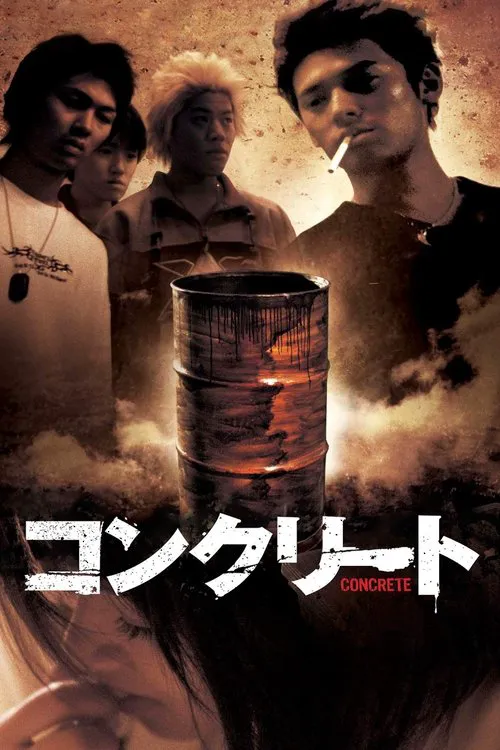Concrete

Plot
Set in Japan during the late 1980s, the movie Concrete, a tragic and disturbing true-crime drama, delves into the darkest aspects of human nature, exploring the devastating consequences of unchecked evil. The film takes audiences on a harrowing journey through the 41 days of unimaginable suffering endured by Furuta Junko, a high-school girl who was kidnapped, brutalized, and ultimately murdered by four youths. As the story unfolds, we meet Furuta Junko, a bright and promising young girl with her entire life ahead of her. The film masterfully portrays her as a normal, innocent, and vulnerable individual who finds herself trapped in a living nightmare. Her abduction sends shockwaves through her family and the entire community, yet the perpetrators' meticulous efforts to conceal their crime, including forcing her to pretend she's okay, stall the investigation. The captors, a group of young males, exemplify the destructive power of toxic masculinity, with their brutal actions driven by a twisted desire for control and dominance. The film portrays their actions as a manifestation of societal ills - of a culture that perpetuates aggression, misogyny, and a disregard for human life. As the days turn into weeks, Junko is subjected to repeated rape, torture, and humiliation, with the captors' actions becoming increasingly depraved. The movie's portrayal of Junko's suffering serves as a stark reminder of the devastating realities of human trafficking and the horrific consequences of inaction. The scenes depicting her brutalization are both gruesome and graphic, highlighting the need for greater awareness and understanding of the severity of these crimes. Through Junko's story, the film sheds light on the complexities of the Japanese justice system, which can be slow to respond to these heinous crimes, often due to factors like witness intimidation, victim blaming, and social stigma. One of the most striking aspects of the movie is its unflinching depiction of the aftermath of Junko's murder. The perpetrators, in a desperate attempt to conceal their crime, resort to an inhumane solution - burying Junko's body in cement. This act serves as a stark reminder of the lengths to which people will go to hide their guilt and avoid accountability. As the authorities ultimately uncover the crime, the film highlights the resilience of the victims' families and loved ones, who must face the unimaginable reality of losing a child or loved one to such brutality. Throughout the film, the cinematography serves as a stark counterpoint to the darkness of the events unfolding on screen, with an aesthetic that is both somber and haunting. The use of muted colors and eerie soundscapes contributes to a sense of unease, underscoring the gravity of the crimes being depicted. As the story reaches its chilling conclusion, the film leaves viewers with a lasting sense of despair and outrage, serving as a poignant reminder of the importance of empathy, understanding, and social awareness. Concrete is a thought-provoking, visually striking drama that masterfully captures the complexities of this heinous true-crime story. While the subject matter is undeniably disturbing, the film ultimately serves as a powerful tribute to the victims and their loved ones, advocating for greater empathy, understanding, and accountability. As a searing indictment of societal ills, Concrete serves as a call to action, urging audiences to confront the darkest aspects of human nature and strive for a more compassionate and just world.
Reviews
Recommendations




